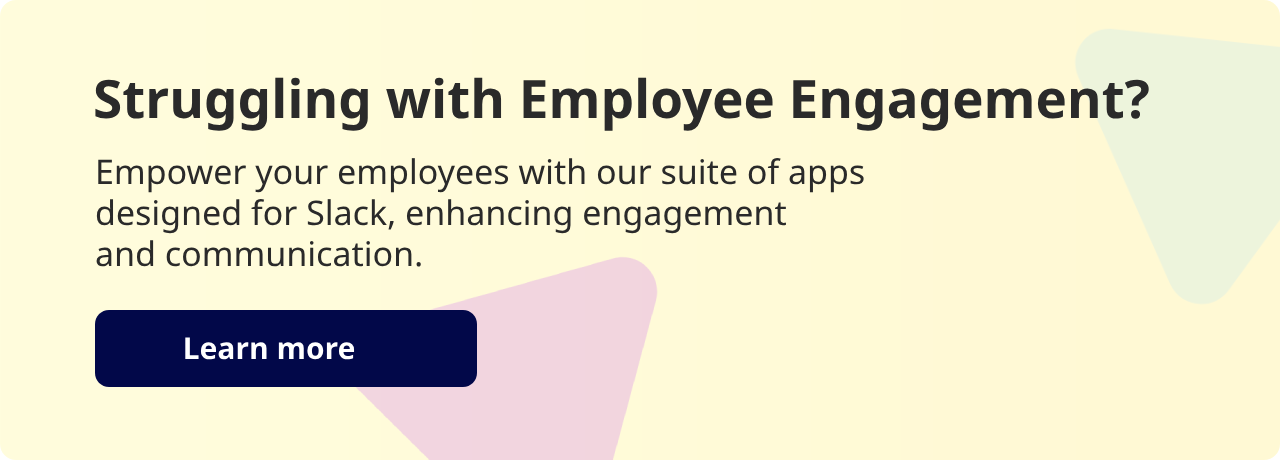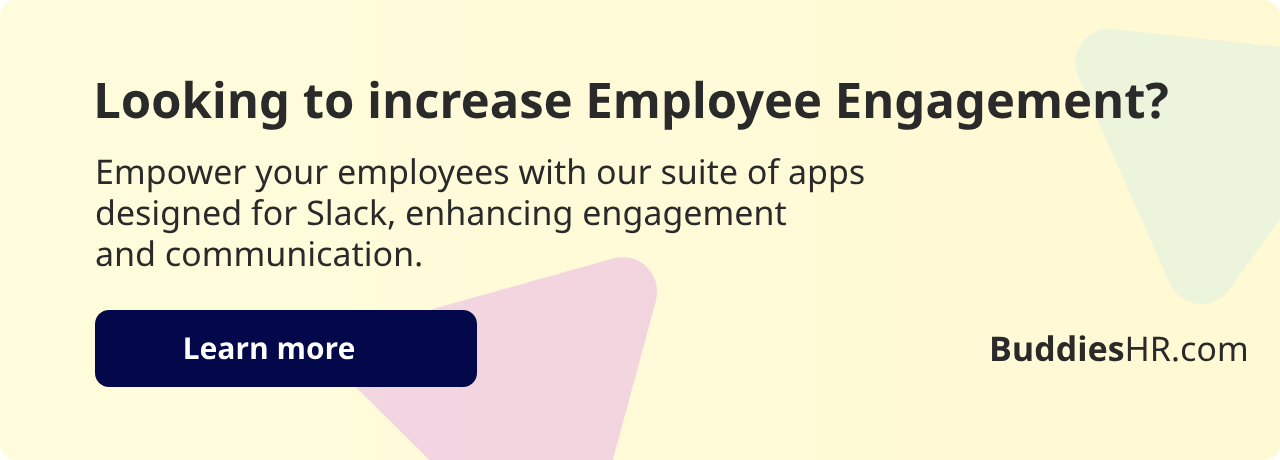How Employee Engagement Fuels Startup Growth
Discover how employee engagement drives startup growth. Learn proven strategies, ROI stats, and top tools to build a motivated, high-impact team.

Time for everyone’s favorite buzzword: employee engagement.
Headlines abound about the dire need for increased employee engagement. Employee engagement is positioned as the key to making remote work “work” for fast-growing startups around the globe.
At the same time, it’s also frustratingly difficult to measure.
And what is employee engagement anyway? I’ll answer that question and more in this guide.
I’m Nahed Khairallah. I’ve worked in and around HR for over a decade, consulting with over 150 companies to help them scale from 7 to 9 figures, fueled by good people practices and strong HR fundamentals. At Organized Chaos, I share my hard-fought wisdom in courses and work directly with clients to help them prime their companies for scale.
I’m also an advisor to the Buddies HR team and will share my thoughts on how employee engagement can drive real growth and ROI for your company.

What do I Mean by “Employee Engagement?”
The “dictionary definition” of employee engagement sounds a bit like this:
“The emotional and psychological connection employees have with their work, team, and organization. It's characterized by employees who are enthusiastic about their roles, committed to the organization's goals, and willing to invest discretionary effort beyond minimum requirements.”
In real-life practical terms, I like to think of employee engagement simply as this: do your employees show up to work energized? Do they care about the problems they need to solve, or are they checked out?
Employee engagement is much more than job satisfaction or happiness. Satisfied employees may show up and do adequate work, but in a startup environment where one employee could be 25% of an entire department, adequate work may not cut it.
Why Employee Engagement Matters
Employee engagement isn’t just a fluff metric. There’s real ROI attached to it:
- It’s estimated that companies lose $450-$550 billion each year due to low engagement.
- Nearly two-thirds of millennials cite passion over pay as a motivator for staying with a job.
- Over a period of seven years, companies with more engaged workers grew revenue 2.5x as much as companies with less engaged workers.
Startups, especially, need all hands on deck, and high employee engagement all but guarantees your team is in it to win it in your company.
Letting employee engagement slide may not seem like a big issue at first. Maybe you notice a few missed meetings there, long lunch breaks here, or habitual “screen off” on Zoom. Given enough time, though, low engagement will bury your company in a lengthy slog while your competitors sprint to the finish line.

How Employee Engagement Drives Growth
The above metrics give you a clearer picture of how ignoring employee engagement can harm your company, so let’s now look at examples of how employee engagement drives growth.
I’ve found the following to be positive impacts of strong employee engagement:
- Faster innovation: Engaged employees actively contribute ideas that fuel growth. The more engaged your teams are, the more likely they will be to experiment, think outside the box, and drive innovation in your company forward.
- Higher productivity: Engaged teams are more productive, full-stop. Engaged teams show a productivity increase of 37%, which means a 10-person engaged startup team performs like a 13-14 person disengaged team – without the additional salary costs.
- Reduced turnover and recruitment costs: Low engagement teams typically endure turnover rates that are 18% to 43% higher than highly engaged teams. Here’s an example to demonstrate: A 100-person startup with high engagement might have 10% annual turnover vs. 25% for a disengaged competitor. At approximately $6,000 per replacement, that's a savings of $90,000 annually, which can be invested in growth initiatives instead of replacement costs. You can estimate the cost of turnover for your company with our this free turnovercost calculator!
Move faster, and break less: that’s the power of a highly engaged team that drives your company forward rather than holds its growth hostage. So how do you engage your employees? Read on for tools and tips next.
The Best Tools for Employee Engagement
Knowing that highly engaged employees can be a multiplier for your business is one thing, but making it happen is an entirely different story.
Zoom happy hours and team hangouts are fine, but to truly engage your employees, you will need to make a consistent effort to build connections between your employees and foster a sense of belonging in your company.
Some of my favorite tools include:
- BuddiesHR: A suite of Slack apps to drive employee engagement in your company. BuddiesHR can be used to celebrate birthdays and work anniversaries, build a peer recognition program, and even manage time off.
- WorkTango: Like BuddiesHR, WorkTango is a comprehensive platform for employee engagement to offer recognition programs, celebrate milestones, run surveys, and more.
- 15Five: A bit more niche than the above, 15Five is a great tool for sparking conversations between managers and employees while gathering insights on what drives and motivates your team.
Of these, I’d happily endorse BuddiesHR as a complete solution for any fast-growing company looking to engage employees and foster a culture — whether that company is remote, hybrid, or in the office. One of the key perks of BuddiesHR as opposed to other comprehensive software platforms is its modular nature: you can mix and match tools to suit your company’s specific needs and scale up usage as your company and culture evolve.
Tools are great, but one of the best ways to drive engagement is to start with highly motivated and talented people ready for the startup grind. Therefore, it’s important that you attract the right hires to your company, which will make things far easier in the long run.
Employee Engagement is a Business Necessity, Not a Nice-to-Have
Employee engagement may be the latest buzzword circling the startup world, but it’s anything but hype.
In the life-or-death, sink-or-swim world of startups, every hire you make must make an impact and drive your company forward. Ensuring that your team is engaged and motivated is one of the best things you can do to put your company in a position to succeed.
This guest post was written by Nahed, CEO of Organized Chaos, an HR consulting and education company helping startups drive growth through their people operations.





